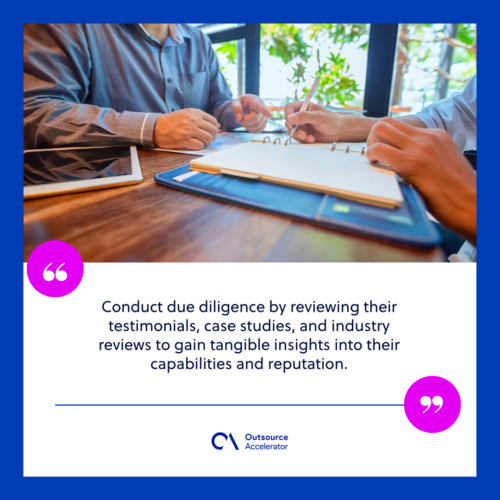Top tips for choosing the right outsourcing partner in 2025

This article is a submission by VIZX Global. VIZX Global short for Vision Execution, is a BPO solutions provider that was established with a clear vision: to nurture transformative ideas from conception to fruition, ultimately cultivating thriving enterprises.
In the recent decades, outsourcing has become a trendsetter for businesses seeking to optimize operations, drive efficiency, and scale effectively. With global outsourcing spending expected to rise in 2025, selecting the right outsourcing partner is more critical than ever.
The wrong choice can result in inefficiencies, security risks, and financial losses, while the right partner can catalyze business growth.
What factors should key decision-makers prioritize when evaluating outsourcing options? This guide explores the top tips for selecting an outsourcing partner in 2025, ensuring a seamless, value-driven collaboration.
10 tips for choosing the right outsourcing partner
Make these decisions when it’s time for you to look for an outsourcing partner:
1. Define your business needs and objectives
Selecting an outsourcing partner is a strategic decision bearing significant business consequences. Hence, businesses must clearly define their objectives before engaging with an outsourcing provider.
Why do you want to outsource? Are you seeking cost reduction, access to specialized skills, improved efficiency, or enhanced scalability?
Understanding your core needs will help you assess potential partners based on their strengths and alignment with your business goals.
Other questions to consider when defining your needs include:
- What specific processes or services do you need to outsource?
- What key performance indicators (KPIs) will measure success?
- Are you looking for long-term strategic partnerships or short-term project-based outsourcing?
A well-defined roadmap allows you to select a provider that best fits your unique requirements.

2. Evaluate industry experience and expertise
Evaluating a service provider’s niche or industry expertise is important as it directly impacts the quality and effectiveness of the service offered. A partner with deep industry knowledge and experience understands your sector’s challenges, compliance requirements, and operational nuances.
Here are key factors to assess when choosing an outsourcing partner based on their industry experience and expertise:
- Years of experience in your industry
- Case studies and success stories
- Certifications and industry recognition
- Understanding of compliance and regulatory standards
For instance, an outsourcing partner with SOC 2 compliance and data security expertise is non-negotiable if you are in the healthcare or finance sector.
3. Assess technological capabilities
Digital transformation will continue to shape the outsourcing landscape in 2025 and beyond.
Therefore, the ideal outsourcing partner should leverage cutting-edge technologies, including artificial intelligence (AI), automation, and cloud-based solutions, to enhance efficiency and productivity.
Here are some tech considerations:
- Does the provider use AI-driven automation for repetitive tasks?
- How do they ensure data security and cybersecurity resilience?
- Are they equipped with cloud-based solutions for seamless collaboration?
- Do they have proprietary technology that enhances service delivery?
A technologically advanced and agile outsourcing partner ensures your business remains competitive and future-ready.
4. Verify scalability and flexibility
Over time, your business needs will evolve, and your outsourcing partner should be able to scale their services accordingly.
Your outsourcing partner should adapt to new requirements and changes throughout your collaboration. These changes may be changing the scope of work, trying out new technology, or accommodating a new business need.
Depending on the needs, your outsourcing partner should also be able to expand or downsize the team working on your project. If your project grows, they should be able to add more team members, and if your needs decrease, they should be able to scale down without disruptions.
Discussing scalability and flexibility upfront will help you avoid getting stuck with a rigid partner.
You can find out their previous experiences with scaling teams and how they handle change. Also, check their contact terms to ensure they capture the flexibility and scalability you need.
5. Prioritize data security and compliance
With increasing cybersecurity threats and regulatory complexities, outsourcing partners must have robust data security measures in place. In 2025, businesses handling sensitive information need assurance that their outsourcing provider complies with industry standards.
Verify that your outsourcing provider adheres to international data security standards and can demonstrate compliance with industry-relevant regulations such as SOC 2, ISO 27001, HIPAA, and GDPR. Further, inquire about their security protocols and disaster recovery plans to ensure they can effectively protect your data.
Failure to choose a security-conscious partner could expose your business to financial and reputational risks.
6. Assess communication and cultural compatibility
Outsourcing involves working with teams across different time zones and cultures. Hence, strong communication frameworks are needed to prevent misunderstandings and ensure smoother operations.
Seamless collaborations and success in such setups require effective communication and a good cultural alignment as follows:
Language proficiency: Check if the team you will be working with can communicate effectively in your preferred language.
Cultural fit: Assess whether your provider is conversant with your culture and whether their corporate culture and values align with yours, as this will affect the communication styles and work ethic.
Time zone compatibility: Time zones are critical in outsourcing, and poor alignment will cause delays. Hence, consider a partner whose time zone aligns with your business hours or offers a beneficial overlap.
7. Review cost structure and pricing transparency
Cost savings are one of the biggest drivers of outsourcing, hence the need for transparent pricing. Have a clear understanding of your outsourcing partner’s pricing models to ensure there are no hidden fees or vague pricing models that can lead to budget overruns.
Consider partners that offer a clear pricing model, whether time and materials, fixed-price, or hybrid, to avoid surprises. The right partner should also offer flexible pricing that accommodates your changing needs over time.
8. Analyze customer support and Service Level Agreements (SLAs)
Reliable customer support is essential for business continuity, especially when a problem arises.
Ensure your provider gives adequate support via different channels like phone, chat, and emails and has an acceptable response time as stipulated in the Service Level Agreements. A strong SLA ensures accountability and quality service delivery.
Here is the SLA Checklist to verify a suitable outsourcing partner:
- Response times for critical issues
- Availability of 24/7 customer support
- Defined escalation procedures for problem resolution
- Performance guarantees and service credits
9. Check client references and reputation
Before signing an agreement to an outsourcing arrangement, verifying the credentials and assessing your potential partner’s past work is prudent.
Conduct due diligence by reviewing their testimonials, case studies, and industry reviews to gain tangible insights into their capabilities and reputation. A proven track record is enough testament to a provider’s credibility and reliability.
Due Diligence steps:
- Request references from past and current clients
- Check online reviews and ratings
- Look for independent third-party assessments or reports
- Engage in pilot projects to assess performance firsthand

10. Foster a collaborative partnership mindset
Outsourcing is more than just a transactional relationship; it should be a strategic partnership. Remember, you are collaborating with an outsourcing partner to help you achieve your business objectives.
Hence, businesses that build strong, collaborative relationships with their outsourcing partners tend to see better long-term outcomes.
For the best results in an outsourcing relationship, consider the following best practices:
- Involve the outsourcing partner in strategic planning discussions
- Maintain open communication lines and regular check-ins
- Share insights, business objectives, and growth plans
- Cultivate a culture of mutual trust and transparency
Finding the outsourcing partner for your needs
Choosing the right outsourcing partner in 2025 is a strategic decision that impacts your business’s efficiency, security, and scalability.
The process is not just about comparing credentials but getting a partner that aligns with your business values and understands your needs. Such a partner will bring strategic insights into your business that will drive success.
Hence, as you include outsourcing as part of your strategic moves in 2025, take time to understand your potential partner’s industry expertise, technological capabilities, scalability, data security, communication, and transparency to ensure a collaboration that drives long-term success.







 Independent
Independent




